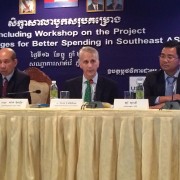
On behalf of the American people, thank you for allowing me to make brief remarks. A fundamental principle in democracy is that citizens have the right to demand accountability and that the government at all levels from the commune council to the national level including the Ministry of Education have an obligation to be accountable. Each and every appointed and elected official and civil servants are accountable for their conduct and performance.
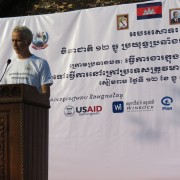
I am honored to be here this afternoon in recognition of Cambodia’s National Day against Trafficking. I would like to recognize the Provincial Committee to Combat Human Trafficking who have worked closely with our partner – Winrock International – to make this event a reality. Too many Cambodians continue to be pushed into situations where they are easily exploited or trafficked. We need to recommit our collective energy to ensure those situations are a thing of the past.
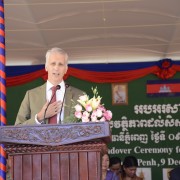
According to the WHO status report on road safety, road traffic accidents result in more than 1 million deaths globally each year. For every 1 person who dies in a road traffic crash, 20 are injured. And 1 in 20 of those injured is left with a disability. At such a scale, this is an issue that impacts each of us. We envision a world where we and our loved ones face fewer risks as we go about our everyday lives.
But the numbers don’t really describe the huge impact that accidents have. A traffic death may cost a family its wage earner. Traffic injuries may mean a child won’t be able to attend school. In short – the accidents have the potential to cost Cambodia’s government and its society heavily. What makes events like today all the more exciting, however, is that we come together not just to discuss the problem, but to celebrate a solution: the Asia Injury Prevention Foundation’s “Head Safe, Helmet On” campaign.
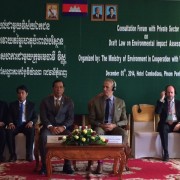
Excellencies, Ladies and Gentlemen:
Good morning. It is my great pleasure to join you here this morning at the Private Sector Forum on the Draft Environmental Impact Assessment Law.
Today’s forum is important, because it addresses a challenge that Cambodia, as well as many countries around the world, are facing: How do we pursue economic development without sacrificing the health of our environment?
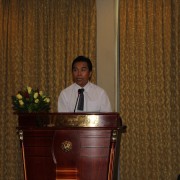
The U.S. Agency for International Development, which I represent, is an important supporter of education around the world. Education is a pathway to better opportunities for every person, their community, and their nation. Through the School Dropout Prevention Program (SDPP), USAID is working closely with the Ministry of Education to achieve Cambodia’s Millennium Development Goal: Universal Access to Basic Education by 2015. The SDPP program supports the Ministry’s policy on Preventing Student from Dropout of School and Information Communication Technology in education, which calls for access to ICT for all teachers and students, especially at the secondary level.








Comment
Make a general inquiry or suggest an improvement.